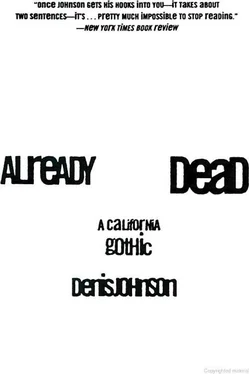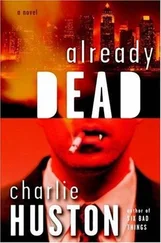“We’re all pretty harmless aren’t we? Until we’re cornered?”
“That’s not reassuring.”
“But I thought you wanted to die.”
“Maybe so. But by my own hand.”
Fairchild closed his eyes, maybe, Van thought, with exasperation.
“The point I was making earlier is this — that each person who went to the movies that day believed each of the others capable of killing all of us. And aren’t they exactly right?”
Fairchild was back at the refrigerator, from which he turned now with an odd, pompous air, upholding a carton of milk. “Who knows what a murderer looks like?”
He stood next to Van’s chair. He leaned too close. “Lately I think I’m ready to become one.” Van smelled the rot of wine on his breath. The hat’s emblem read IGNORE PREVIOUS HAT.
Van relaxed. “I see. You’re just fucking with me.” 72 / Denis Johnson
“Hermann Göring,” Fairchild said, pouring milk over his cereal with unsteady hands, “was found at the end dressed in a Japanese kimono and stoned on opium, wearing lipstick and eye shadow and playing with a model concrete railroad in his living room — that’s how crazy you have to be to kill as many people as Hermann Göring did. This is how crazy you have to be to kill one . As crazy as me. Allow me:” He tipped the carton and loosed a quavering ribbon of milk over Van’s bowl.
As soon as he put a spoonful to his lips Van realized what a hunger he had. But the flakes were hard on his throat. He waited for them to wilt in the bowl.
Fairchild said, “Of course I’m simplifying. It may be that in a case like Hermann Göring’s that’s how crazy you get from killing that many people, and this is how crazy you have to be to start .”
“Your guess is as good as mine.”
“One murder probably leads to another.”
“I wouldn’t know.”
“Why don’t we find out?”
“I don’t get the meaning.”
“Would you like to find out?”
“Find what out?”
“I’d like you to kill somebody for me. I’d make it worth your while.”
“You’d make it worth my while?” Van said. “What the fuck is ‘worth my while’?”
“Money, whatever.”
So he’d done it. He’d killed himself. And he’d surfaced into this. All right. It was the next thing happening, and that was that. “Money doesn’t work for me,” he said.
“What would?”
Van Ness hadn’t touched a drop of wine, but the room was accelerating anyway. “I’ll do it. Sure.”
“What would work for you?”
The chickenshit. He was going to ride right past it. “I said I’ll do it.” Fairchild stood up and said, “Louise.” He put his thumb and finger to his eyes and pressed. Visibly composed a speech in his mind and then launched into it, crunching the phrases in the collision of emotions.
“In the place where Louise works there is a lady called the Singapore Lady. The Singapore Lady was once a wild young woman Already Dead / 73
married by common law to a carpenter there in San Francisco. She was the terror of the neighborhood. But the carpenter wasn’t afraid of her; he came home late, he catted around. He didn’t care if the Singapore Lady knew. Mistake! She stabbed him in the eye, and he died. Then, with his own saw she sawed him into thirteen pieces. She put the pieces of her husband in a big trunk and had it shipped to a fictitious address in Singapore. Well, during its journey the stink of the corpse became profound and somebody opened the trunk to find green arms and legs and green other parts, including the one-eyed staring head. The woman was quickly arrested — why? Because she’d put her return address on the trunk. Louise says they call her the Singapore Lady because for the last twenty years she’s been wrapping empty packages, addressing them to Singapore, and handing them over to the counselors and guards at the prison to be mailed.
“Louise is my mother. On the day I went to San Francisco she had three months to go before retirement. I wanted to go see her while she was still working in order to avoid the possibility of a longer visit.” Van had eaten most of his cereal. He pushed the bowl away and sat back. “Ignore Previous Hat, huh?”
Fairchild said, “I’m thinking of inviting you to be my accomplice in a murder.”
“I said okay,” Van said.
“Actually, my henchman.”
Van said nothing.
“Does one murder lead to another? I think it does, because I’m suddenly, now, already thinking in terms of killing two more. Maybe three.
Or at least one more. Harry Lally.”
Night had come and turned the windows to mirrors. Fairchild had a habit of studying his image, moving closer, peering right at the reflected mouth as it spoke. “You do this murder. Maybe you should kill everybody who troubles me! Anyway you do this murder. Then you come back here — well, no, definitely not back here — but somewhere; you go somewhere. And finish committing suicide.” But the guy had a psychotic charm. He entertained. “Have you been diagnosed?”
Among his windows Fairchild kept silent a minute, untwisting cords from their stays and loosing scrolls of rattan down over the glass. “You don’t know the situation. Anybody would go crazy.” 74 / Denis Johnson
“No — I think you’re fine. But I was wondering what the professionals had to say.”
“You wonder why I’d want to get someone killed. I won’t just answer
‘why not.’ But the question implies that a person would have good reasons, and that’s a lie. There are pressures, yes. But nothing to justify it.” He sat down.
Van thought Fairchild was about to take his hand — something about his hesitation, his gravity — but he didn’t.
“I am in trouble with my criminal associates. I owe a vast sum of money. My wife’s insurance would take care of that if she died. I can’t get money otherwise — nobody will give me any, particularly not Father, and anyway the words to ask him have been closed inside the fist of hate for decades now. It would be easier for me to let them kill me, or go to Clarence and say, ‘Listen to me please; I want you to grease Winona; snuff the bitch.’ Or something a little more subtle but with the same meaning.
“You had no right to spill my table,” he added suddenly. “You broke my things. These things are mine.”
“Clarence is who?”
“The only guy I know who’s actually really killed people.”
“This is about money? Divorce her and sell the house.”
“If you go out the door and look west,” Fairchild said, “you’ll see all I stand to lose by divorcing her. All that land and all that timber. From here to the ocean.”
“It’s hers?”
“It’s my father’s, and he’s willed my share of it to her. My Catholic dad. To keep us married.”
“Why not disappear? Pick up and boogie?”
“Or why not kill myself?”
“Why not?”
“The ultimate disappearance. The ultimate boogie.” Van laughed. It hurt, and he stopped himself. “How old are you?”
“I turned twenty-nine three weeks ago.”
“And who do you want killed?”
“My wife, Winona Fairchild.”
“Yeah…that name.”
“Winona.”
“I think I met her.”
“You met her?”
Already Dead / 75
“Yes, I met her. In Shelter Cove.”
“That’s no place to meet anyone.”
“I met her there anyway.”
Fairchild jerked at the pocket of his bathrobe. Produced his deck of cards. Laid himself out a hand of…Klondike, if Van knew his solitaire.
It was dramatic, really kind of striking, Van thought, the way he fought through pain by clinging to something, anything, of interest . “ Bushido ,” Fairchild said now — Van had known him a single afternoon but already could tell when a lecture, like a whale, was surfacing—“do you know the word? Bushido means ‘the way of the warrior,’ a Japanese samurai concept. The idea is, the samurai achieves total detachment by seeing himself as already dead. I invite the would-be suicide to adopt this concept.”
Читать дальше












